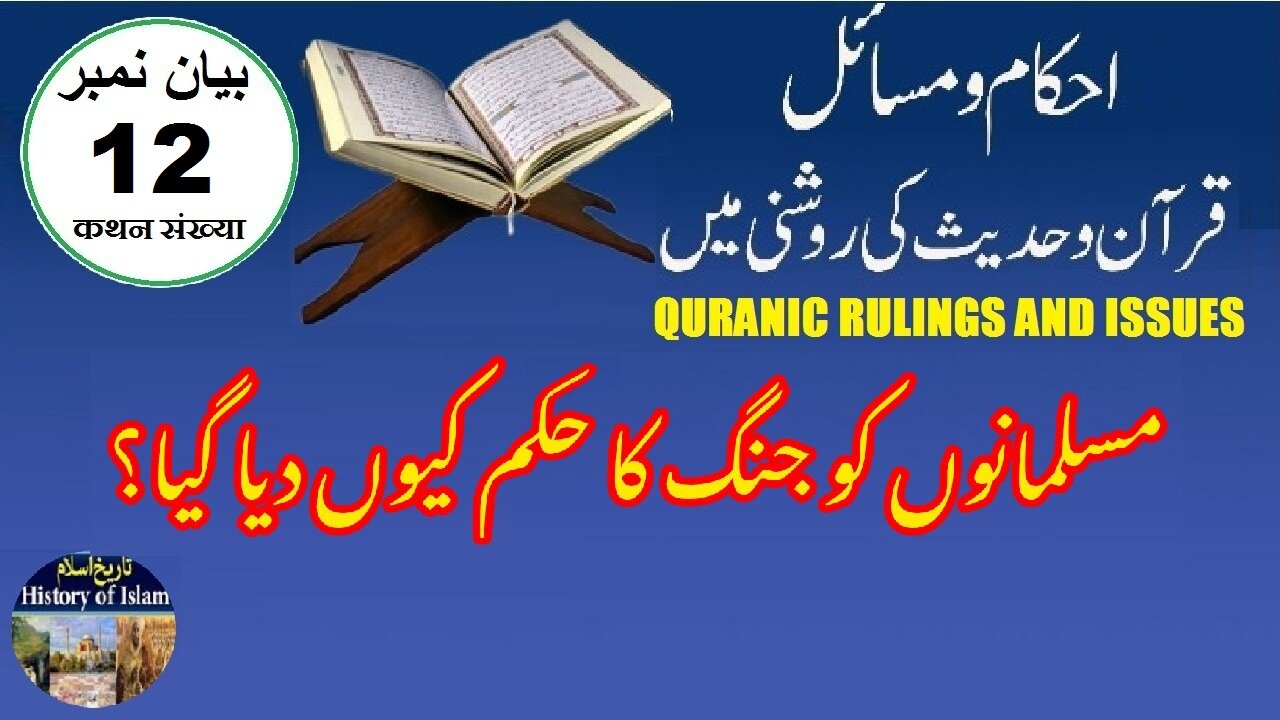Premium Only Content

Why were Muslims ordered to fight مسلمانوں کو جنگ کا حکم کیوں دیا گیا ؟
@islamichistory813 #why #were #muslims #commanded #to #fight #islamicbayan #qurantafseer #hadithlessons #ilmdeen #quranwisdom #rozanabayan #sunnahteachings #imanibaatain #islamicknowledge #masailkaahal #quranstories
#deenreminder #hadithseikhtalat #islamicsolutions #ilmokhikmat
#dailybayan #sunnatseekhain #islamicevents #deenikahaniyan
#quranmessage #islamiclessons #islamiwaqiat #bayanseries #quranreminder #islamicwisdom
Why were Muslims commanded to fight?
I begin in the name of Allah, the Most Gracious, the Most Merciful. Alhamdulillah, by the grace of Allah Almighty, we are beginning Statement No. 12. Our aim is to learn and teach from the Quran and Sunnah, understand the rulings, reflect on history, and seek solutions to problems with divine guidance. May Allah Almighty make this statement beneficial and a source of light for all hearts.
Today we will be describe, That Why were Muslims commanded to fight?
Islam, as a religion of justice and mercy, sets strict ethical rules regarding fighting, making it distinct from the blind aggression and oppression practiced by many throughout history. The Qur’an and Hadith both emphasize that when Muslims are commanded to fight, it must be governed by morality, justice, and compassion. Allah says in Surah Al-Baqarah, verse 190: “And fight in the way of Allah those who fight you, but do not transgress. Indeed, Allah does not like transgressors”. This verse lays down the first and most important principle: fighting is only against those who attack, and even then, Muslims are forbidden from crossing limits. The prohibition of transgression includes harming non-combatants, breaking treaties, spreading corruption, or fighting for worldly gain. Instead, the purpose of fighting is to protect faith, resist oppression, and uphold justice.
One of the most emphasized rules is the protection of non-combatants such as women, children, elderly, and monks. The Prophet Muhammad (PBUH) gave clear instructions: “Do not kill women or children”* (Sahih Muslim, Hadith 1731). In another narration, Abdullah ibn Umar reported that the Messenger of Allah Almighty forbade the killing of women and children in battle (Sahih al-Bukhari, Hadith 3015). Similarly, Abu Bakr al-Siddiq, the first caliph, when sending out Muslim armies, instructed them: “Do not kill women, do not kill children, do not kill the elderly, do not cut down fruit-bearing trees, do not destroy inhabited places, do not slaughter sheep or camels except for food, do not burn bees and do not scatter them, and do not steal from the booty” (Muwatta Imam Malik, Hadith 987). These instructions show the depth of Islamic war ethics: even animals, trees, and crops were to be protected, demonstrating that war in Islam was never meant to destroy but only to defend and restore peace.
Another important ethical principle is honoring treaties and avoiding treachery. The Qur’an commands in Surah Al-Anfal verse 58: “If you fear treachery from a people, throw their treaty back to them [putting you] on equal terms. Indeed, Allah does not like traitors”. This means that Muslims are not allowed to betray agreements or engage in secret deception; if an enemy breaks a treaty, Muslims must openly declare the end of that treaty before any fighting. The Prophet (PBUH) said: “Whoever kills a person who has a treaty with the Muslims will not smell the fragrance of Paradise, though its fragrance is found for a distance of forty years”* (Sahih al-Bukhari, Hadith 3166). This hadith establishes the sanctity of life for those under Muslim protection, showing that even in times of war, treachery is forbidden.
Islam also prohibits fighting for arrogance, nationalism, or worldly gain. The Prophet (PBUH) was asked about a man who fights out of bravery, another out of pride, and another to show off. He replied: “The one who fights so that the word of Allah is supreme, he is in the way of Allah” (Sahih al-Bukhari, Hadith 2810; Sahih Muslim, Hadith 1904). This shows that the only acceptable intention for fighting is to establish justice and truth, not for personal power or dominance. Thus, jihad is only valid when it is for Allah’s sake, and not for worldly ambitions.
Another principle is stopping the fighting if the enemy inclines toward peace. Allah says in Surah Al-Anfal verse 61: “And if they incline to peace, then incline to it [also] and rely upon Allah”. This ensures that Muslims cannot continue fighting out of vengeance or hatred once peace is possible. The Prophet (PBUH) himself accepted peace treaties, such as the Treaty of Hudaybiyyah, even when the terms seemed unfavorable to the Muslims, because peace was prioritized over war.
Furthermore, Islam emphasizes mercy even in the midst of battle. The Prophet PBUH) prohibited torture, mutilation, and cruelty, saying: “Do not mutilate” (Sahih Muslim, Hadith 1731). Prisoners of war were to be treated with dignity, and the Qur’an praises those who feed captives out of kindness: Surah Al-Insan verse 8 “And they give food in spite of love for it to the needy, the orphan, and the captive”. This demonstrates that even enemies captured in battle had rights and were to be cared for compassionately.
In conclusion, the ethical rules of fighting in Islam are firmly rooted in justice, mercy, and restraint. Muslims are commanded to fight only in defense or to end oppression (Surah Al-Baqarah,verse 190; Surah An-Nisa, verse 75, forbidden from harming non-combatants (Sahih Muslim, Hadith 1731), prohibited from betrayal or treachery (Surah Al-Anfal, verse 58), and obligated to honor peace when offered (Surah Al-Anfal, verse 61). The Prophet (PBUH) and the Rightly Guided Caliphs reinforced these principles, ensuring that war in Islam was never for conquest, cruelty, or destruction, but for justice, mercy, and protection of the weak. These timeless rules show that Islam views even the harsh reality of war through the lens of ethics and accountability before Allah.
We conclude today's discourse with this humble supplication: O Allah, purify our hearts, accept our deeds, forgive our sins, and include us among Your grateful servants. Bless us in our time, our families, and our faith, and gather us under the shade of Your mercy on the Day of Judgment. Amen
Allah Hafiz
=======================================
-
 9:58
9:58
ISLAMIC HISTORY
2 hours agoIslamic History Episode 236 Mutawakkil Ali Allah, Armenian Revolt متوکل علی اللہ ، بغاوت آرمینیا
1 -

The Rubin Report
1 hour agoCharlie Kirk’s Murder Has Officially Backfired
7.65K8 -
 1:00:09
1:00:09
VINCE
3 hours agoThe Globalists SABOTAGE Trump At The U.N.? | Episode 132 - 09/24/25
178K109 -
 DVR
DVR
Bannons War Room
7 months agoWarRoom Live
37.8M8.79K -
 LIVE
LIVE
LFA TV
12 hours agoBREAKING NEWS: SHOOTER IN DALLAS! | WEDNESDAY 9/24/25
4,701 watching -
 1:54:17
1:54:17
Nikko Ortiz
2 hours agoBEST Place To Go During World War 3
17.6K1 -
 LIVE
LIVE
Trumpet Daily
21 minutes agoTrumpet Daily LIVE | Sept. 24, 2025
312 watching -
 LIVE
LIVE
The Shannon Joy Show
1 hour agoWTF? Technofascist Trump Tells UN He Will Launch A Global AI ID System. Guest: Derrick Broze!
157 watching -

Benny Johnson
2 hours agoBREAKING: Left-Wing Terrorist Attack at ICE Facility, Sniper Opens Fire | Kimmel Sobs in Non-Apology
43K55 -

The Big Mig™
3 hours agoTrump, Chuck Schumer & Hakeem Jeffries Can Go Pound Sand!
5.55K4